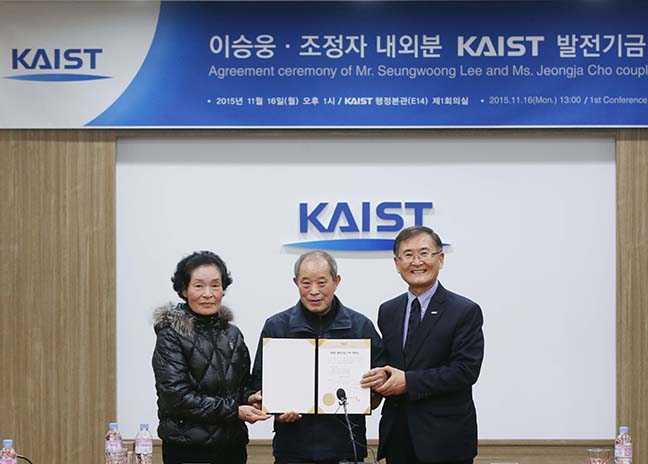fund
“We’ve made a real effort to save our money, but can’t spend it all just on ourselves. Please use it to foster talented students in the field of science, who will enrich our country,” said donors at the donation ceremony held today on campus.
A married couple in their 70s donated their real estate, worth approximately USD 6.41 million, to KAIST on November 16, 2015. Seung-Woong Lee, the husband, and Jeong-Ja Cho, his wife, turned over three properties, including buildings in Seoul and Uijeongbu, to the university.
The couple made a promise to themselves to return their assets back to the Korean society since the beginning of their marriage life. They decided that KAIST was the institution with the most potential to contribute to Korea’s growth. This spring they took that step.
The Lee couple said, “We strove to be frugal to gather such a sum of money. We engaged in all sorts of jobs after we left for Seoul from the countryside when the nation was impoverished.”
Mr. Lee said, “On one snowy winter day, I was riding a bicycle on my way back home. Then I saw a restaurant and, at that moment, I yearned for a bowl of soup in such cold weather. But I just rode past because the whole family could eat with the money that I would spend for the soup.”
Ms. Cho said, “At the beginning, I was rather unhappy with my husband’s very frugal personality. But as time passed, I noticed I had become just like him.” She added, smiling, “I often wandered around the market to get even the smallest discounts, and the shops sometimes refused to sell me the goods.”
Their assets are the result of that work ethic and humility. The couple said, “Today is definitely the happiest day of our life because we would keep our promise. We hope that KAIST will foster outstanding talents in the field of science and technology, students who will advance our nation in the future.”
President Steve Kang of KAIST said, “I would like to express my most sincere gratitude toward to this generous couple who have donated their lifetime assets so willingly to KAIST. Their invaluable support will surely become our springboard to continuously pursue our excellence in science and technology.”
In the picture from left to right are Ms. Jeong-Ja Cho (wife), Mr. Seung-Woong Lee (husband), and President Steve Kang.

-
event <Big Coins> Exhibition: Where Coins and Imagination Collide - Held at SUPEX Hall, KAIST Seoul Campus
KAIST (President Kwang-Hyung Lee) announced on May 19th the opening of the solo exhibition, “Big Coins,” by photographer and media artist Hojun Ji (Adjunct Professor, Department of Industrial Design) at the SUPEX Hall in the Business School of the Seoul Campus. The exhibition will run from May 19th to the end of February of the following year. This exhibition at the KAIST Seoul Campus Business School presents artworks with an insightful perspective, inviting diverse interpretations
2025-05-20 -
research “For the First Time, We Shared a Meaningful Exchange”: KAIST Develops an AI App for Parents and Minimally Verbal Autistic Children Connect
• KAIST team up with NAVER AI Lab and Dodakim Child Development Center Develop ‘AAcessTalk’, an AI-driven Communication Tool bridging the gap Between Children with Autism and their Parents • The project earned the prestigious Best Paper Award at the ACM CHI 2025, the Premier International Conference in Human-Computer Interaction • Families share heartwarming stories of breakthrough communication and newfound understanding. < Photo 1. (From left) Professor Hw
2025-05-19 -
research Decoding Fear: KAIST Identifies An Affective Brain Circuit Crucial for Fear Memory Formation by Non-nociceptive Threat Stimulus
Fear memories can form in the brain following exposure to threatening situations such as natural disasters, accidents, or violence. When these memories become excessive or distorted, they can lead to severe mental health disorders, including post-traumatic stress disorder (PTSD), anxiety disorders, and depression. However, the mechanisms underlying fear memory formation triggered by affective pain rather than direct physical pain have remained largely unexplored – until now. A KAIST resea
2025-05-15 -
research KAIST Discovers Protein Switch that Turns Anti-Viral Immune Response On and Off
Even after the COVID-19 pandemic, various new infectious diseases continue to emerge, posing ongoing viral threats that demand robust and sustained immune defenses. However, excessive immune reactions can also harm body tissues, causing significant health issues. KAIST and an international research team have discovered a critical protein that acts as a 'switch' regulating immune responses to viruses. This breakthrough is expected to lay the groundwork for future infectious disease responses and
2025-05-14 -
research KAIST's Pioneering VR Precision Technology & Choreography Tool Receive Spotlights at CHI 2025
Accurate pointing in virtual spaces is essential for seamless interaction. If pointing is not precise, selecting the desired object becomes challenging, breaking user immersion and reducing overall experience quality. KAIST researchers have developed a technology that offers a vivid, lifelike experience in virtual space, alongside a new tool that assists choreographers throughout the creative process. KAIST (President Kwang-Hyung Lee) announced on May 13th that a research team led by Professor
2025-05-13